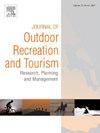Dual trust, emotional bond, and tourists’ on-site pro-environmental behavior at nature-based destinations: Extending norm-activation theory from the perspective of social dilemma
IF 4.4
3区 管理学
Q1 HOSPITALITY, LEISURE, SPORT & TOURISM
Journal of Outdoor Recreation and Tourism-Research Planning and Management
Pub Date : 2024-11-22
DOI:10.1016/j.jort.2024.100839
引用次数: 0
Abstract
The sustainable development of tourism is closely tied to the protection and preservation of natural environments, particularly in nature-based destinations where the appeal and competitiveness depend heavily on the quality of environmental resources. Among the various strategies to enhance environmental sustainability, a strong emphasis has been placed on encouraging tourists to engage in spontaneous on-site pro-environmental behavior (PEB). However, tourists' participation in PEB at travel destinations often presents a scenario of social dilemma, where individual interests conflict with collective benefits. This conflict often makes individuals less willing to engage in PEB in the tourism context than they would in their everyday environments. To address this issue, the study advances the norm-activation theory (NAT), a well-established framework in PEB studies, by incorporating trust and emotion—two critical factors in resolving social dilemmas. An integrated model was proposed to better understand and predict the formation of tourists' on-site PEB and was empirically tested on a sample of 544 visitors from three natural parks in Hangzhou, China. The results reveal that (1) the two dimensions of trust—interpersonal trust and outcome trust—have significant effects on the key cognitive variables in NAT, namely ascription of responsibility and awareness of consequence, and (2) the emotional bond developed between tourists and the destination significantly enhances the link between ascription of responsibility and tourists' PEB intentions through the mediation of personal norm. These findings suggest that innovative interactive-based approaches can be implemented to more effectively promote tourists’ on-site PEB, thereby fostering sustainability in nature-based destinations.
双重信任、情感纽带与游客在以自然为基础的旅游目的地的现场亲环境行为:从社会困境的角度扩展规范激活理论
旅游业的可持续发展与自然环境的保护和保存密切相关,特别是在以自然为基础的旅游目的地,其吸引力和竞争力在很大程度上取决于环境资源的质量。在加强环境可持续性的各种战略中,鼓励游客自发参与现场亲环境行为(PEB)一直是重点。然而,游客在旅游目的地参与亲环境行为往往会出现个人利益与集体利益相冲突的社会困境。这种冲突往往使个人在旅游环境中参与 PEB 的意愿低于在日常环境中参与 PEB 的意愿。为解决这一问题,本研究推进了规范激活理论(NAT)这一在 PEB 研究中行之有效的框架,将信任和情感这两个解决社会困境的关键因素纳入其中。为了更好地理解和预测游客现场 PEB 的形成,我们提出了一个综合模型,并以中国杭州三个自然公园的 544 名游客为样本进行了实证检验。结果表明:(1)信任的两个维度--人际信任和结果信任--对NAT中的关键认知变量(即责任归属和后果意识)有显著影响;(2)游客与目的地之间建立的情感纽带通过个人规范的中介作用显著增强了责任归属与游客PEB意向之间的联系。这些研究结果表明,基于互动的创新方法可以更有效地促进游客的现场 PEB,从而促进以自然为基础的旅游目的地的可持续发展。
本文章由计算机程序翻译,如有差异,请以英文原文为准。
求助全文
约1分钟内获得全文
求助全文
来源期刊

Journal of Outdoor Recreation and Tourism-Research Planning and Management
HOSPITALITY, LEISURE, SPORT & TOURISM-
CiteScore
6.70
自引率
5.30%
发文量
84
期刊介绍:
Journal of Outdoor Recreation and Tourism offers a dedicated outlet for research relevant to social sciences and natural resources. The journal publishes peer reviewed original research on all aspects of outdoor recreation planning and management, covering the entire spectrum of settings from wilderness to urban outdoor recreation opportunities. It also focuses on new products and findings in nature based tourism and park management. JORT is an interdisciplinary and transdisciplinary journal, articles may focus on any aspect of theory, method, or concept of outdoor recreation research, planning or management, and interdisciplinary work is especially welcome, and may be of a theoretical and/or a case study nature. Depending on the topic of investigation, articles may be positioned within one academic discipline, or draw from several disciplines in an integrative manner, with overarching relevance to social sciences and natural resources. JORT is international in scope and attracts scholars from all reaches of the world to facilitate the exchange of ideas. As such, the journal enhances understanding of scientific knowledge, empirical results, and practitioners'' needs. Therefore in JORT each article is accompanied by an executive summary, written by the editors or authors, highlighting the planning and management relevant aspects of the article.
 求助内容:
求助内容: 应助结果提醒方式:
应助结果提醒方式:


